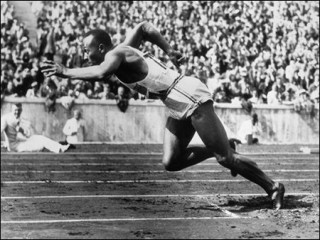
Owens Jesse biography
Date of birth : 1913-09-12
Date of death : 1980-03-31
Birthplace : Oakville, Alabama, USA
Nationality : American
Category : Arts and Entertainment
Last modified : 2010-05-22
Credited as : Athlete, World records, Sprint long jump
Although he would break three world records and tie another in a single collegiate track-and-field competition, Jessie Owens would later earn four gold medals at the 1936 Berlin Olympics. This was a direct jab in the face of Hitler who had, in the days prior to the events, boasted the superiority of Aryan athletes. Jesse Owens would return home a hero, but he found that racism still permeated the throngs of American society, so much that he almost didn’t find funding to finish his senior year at college.
Born in Alabama, the young Jesse was always remembered as a sickly child who could hardly do work in the fields alongside his brothers and father. Looking for a better life, the family moved north into Ohio where they hoped to find better-paying jobs. Owens was able to go to school in Ohio, where he became interested in track and field. By high school, Jesse had already set new school records. He went on to win three events in the National Interscholastic Championships in 1933.
Attending university was only a dream due to his father’s struggle to find work that would support his family. When his father found work with the help of Ohio State University, Owens was able to attend classes, hold three jobs, and train for his athletic pursuits. At a competition at the University of Michigan, Owens set three new world records; the long jump record stood for well over 25 years.
After his Olympic and collegiate career, Owens had some difficulty finding employment, but was approached by some companies who wanted to use his name. While some deals went awry, others brought him enough money to survive. He was soon appointed director of minority employment at the Ford Motor Company, but later became the secretary of the Illinois Athletic Commission and the Illinois Youth Commission. He was also able to gain enough sponsorship to host the first-ever Youth Olympic Games in Chicago.
With his career in place, he was able to travel both at home and abroad and lecture about the value of sports, physical fitness, and promoting countries to support their athletes so that they are given a chance to succeed. Only after decades of public service and winning four gold medals did Owens received a Medal of Freedom from president Gerald Ford. Ten years after his death, Owens was posthumously awarded the Congressional Gold Medal by President George Bush in 1990.
Awards, tributes and honors
* In 1970, Owens was inducted to the Alabama Sports Hall of Fame.
* In 1976 he was awarded the Presidential Medal of Freedom by President Gerald Ford.
* In 1980, a new asteroid was discovered by A. Mrkos at Klet which was named as 6758 Jesseowens in honour of Jesse Owens.
* USA Track and Field created the Jesse Owens Award in 1981, which is given annually to the country's top track and field athlete.
* In 1984, an Emmy Award-winning biographical television film of his life, The Jesse Owens Story, was released, with Dorian Harewood portraying Owens.
* In 1984 a street near the Olympic Stadium in Berlin was renamed Jesse-Owens-Allee, and the Jesse Owens Realschule/Oberschule (a secondary school) in Berlin-Lichtenberg, was named for him.
* On March 28, 1990, Owens was posthumously awarded the Congressional Gold Medal by President George H. W. Bush.
* Two U.S. postage stamps have been issued to honor Owens, one in 1990 and another in 1998.
* In 1996, Owens's hometown of Oakville, Alabama dedicated Jesse Owens Memorial Park in his honor, at the same time that the Olympic Torch came through the community, 60 years after his Olympic triumph. An article in the Wall Street Journal of June 7, 1996, covered the event and included this inscription written by poet Charles Ghigna that appears on a bronze plaque at the Park:
May his light shine forever as a symbol
for all who run for the freedom of sport,
for the spirit of humanity,
for the memory of Jesse Owens.
* In 2001, Ohio State University dedicated Jesse Owens Memorial Stadium for track and field events. The campus also houses three recreational centers for students and staff named in his honor.
* In 2002, scholar Molefi Kete Asante listed Jesse Owens on his list of 100 Greatest African Americans.
* In Cleveland, Ohio, there is a statue of Owens, dressed in his Ohio State track suit, in Fort Huntington Park at West 3rd Street and Lakeside Avenue, west of the old Courthouse.
* In Phoenix, Arizona, there is the Jesse Owens Medical Plaza, named in his honor. It is located on the southeast corner of Baseline Road and Jesse Owens Parkway. Jesse Owens Park, located in Tucson, Arizona, is a staple of local youth athletics there.
* At the 2009 World Athletic Championships in Berlin, all members of the United States Track & Field team wore badges with "JO" to commemorate Owens's victories in the same stadium 73 years earlier.
* In early 2010, Owens was proposed by the Ohio Historical Society as a finalist in a statewide vote for inclusion in Statuary Hall at the United States Capitol.
















